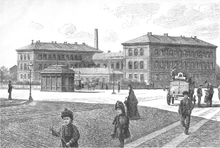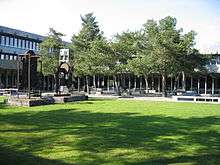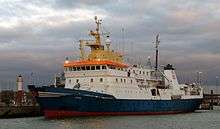Technical University of Denmark
The Technical University of Denmark (Danish: Danmarks Tekniske Universitet), often simply referred to as DTU, is a university in the town Kongens Lyngby, 12 kilometres (7.5 mi) north of central Copenhagen, Denmark. It was founded in 1829 at the initiative of Hans Christian Ørsted as Denmark's first polytechnic, and it is today ranked among Europe's leading engineering institutions.
Danmarks Tekniske Universitet | |
.svg.png) | |
Former names | Den Polytekniske Læreanstalt (1829–1933) Danmarks Tekniske Højskole (1933–1994) |
|---|---|
| Type | Public, Technical |
| Established | 1829 |
| Chairman | Per Falholt |
| President | Anders Bjarklev |
| Provost | Rasmus Larsen |
| Dean | Philip Binning and Martin Vigild |
| Director | Claus Nielsen |
Academic staff | 2,003[1] |
Administrative staff | 1,540[1] |
| Students | 11,031[2] |
| Undergraduates | 7,197[2] |
| Postgraduates | 3,834[2] |
| 1,330[2] | |
| Location | Kgs. Lyngby, Lyngby-Taarbæk Municipality, Copenhagen , |
| Colors | Red, gray and black |
| Nickname | DTU |
| Affiliations | EUA, CDIO, TIME, CESAER and Eurotech |
| Sports | Rugby union, Volleyball |
| Website | www.dtu.dk/ |
 | |
Along with École Polytechnique in Paris, École Polytechnique Fédérale de Lausanne, Eindhoven University of Technology, Technical University of Munich and Technion – Israel Institute of Technology, DTU is a member of Eurotech Universities.[3]
History
DTU was founded in 1829 as the "College of Advanced Technology" (Danish: Den Polytekniske Læreanstalt). The Physicist Hans Christian Ørsted, at that time a professor at the University of Copenhagen, was one of the driving forces behind this initiative. He was inspired by the École Polytechnique in Paris, France which Ørsted had visited as a young scientist. The new institution was inaugurated on 5 November 1829 with Ørsted becoming its Principal, a position he held until his death in 1851.[4]

The first home of the new college consisted of two buildings located in Studiestræde and St- Pederstræde in the center of Copenhagen. Although these buildings were expanded several times, they eventually became inadequate for the requirements of the college. In 1890 a new building complex was completed and inaugurated located in Sølvgade. The new buildings were designed by the architect Johan Daniel Herholdt.[4]
In 1903, the College of Advanced Technology commenced the education of electrical engineers in addition to that of the construction engineers, the production engineers, and the mechanical engineers who already at that time were being educated at the college.
In the 1920s, space again became insufficient and in 1929 the foundation stone was laid for a new school at Østervold. Completion of this building was delayed by World War II and it was not completed before 1954.[4]
From 1933, the institution was officially known as Danmarks tekniske Højskole (DtH), which commonly was translated into English, as the 'Technical University of Denmark'. On 1 April 1994, in connection with the joining of Danmarks Ingeniørakademi (DIA) and DTH, the Danish name was changed to Danmarks Tekniske Universitet, this done to include the word 'University' thus giving rise to the initials DTU by which the university is commonly known today. The formal name, Den Polytekniske Læreanstalt, Danmarks Tekniske Universitet, however, still includes the original name.


In 1960 a decision was made to move the College of Advanced Technology to new and larger facilities in Lyngby north of Copenhagen. They were inaugurated on 17 May 1974.[4]
On 23 and 24 November 1967, the University Computing Center hosted the NATO Science Committee's Study Group first meeting discussing the newly coined term "Software Engineering".[5]
On 1 January 2007, the university was merged with the following Danish research centers: Forskningscenter Risø, Danmarks Fødevareforskning, Danmarks Fiskeriundersøgelser (from 1 January 2008: National Institute for Aquatic Resources; DTU Aqua), Danmarks Rumcenter, and Danmarks Transport-Forskning.
Organization and administration
The university is governed by a board consisting of 10 members: Six members are recruited from outside the university and they form the majority of the board. One member is appointed by the scientific staff and one member is appointed by the administrative staff. Two members are appointed by the university students.
The President of DTU is appointed by the university board. The President in turn appoints the Deans, and the Deans appoint the Heads of the departments.
In 2014, DTU was granted institutional accreditation by the Danish Accreditation Institution (a member of ENQA). The institutional accreditation ensures that the quality assurance system of the institution is well-described, well-argued, and well-functioning in practice.
Since DTU has no faculty senate, and since the faculty is not involved in the appointment of the President, Deans, or Department heads, the university has no faculty governance.[6]
Departments
- DTU Aqua, National Institute for Aquatic Resources
- DTU Business, DTU Executive School of Business
- DTU Cen, Center for Electron Nanoscopy
- DTU Centre for Technology Entrepreneurship
- DTU Chemical Engineering, Department of Chemical and Biochemical Engineering
- DTU Chemistry, Department of Chemistry
- DTU Civil Engineering, Department of Civil Engineering
- DTU Compute, Institut for Matematik og Computer Science
- DTU Danchip, National Center for Micro and Nanofabrication
- DTU Diplom, Department of Bachelor Engineering
- DTU Electrical Engineering, Department of Electrical Engineering
- DTU Environment, Department of Environmental Engineering
- DTU Executive School of Business
- DTU Food, National Food Institute
- DTU Fotonik, Department of Photonics Engineering
- DTU Management Engineering, Department of Management Engineering
- DTU Mechanical Engineering, Department of Mechanical Engineering
- DTU Nanotech, Department of Micro-and Nanotechnology
- DTU Physics, Department of Physics
- Risø DTU, National Laboratory for Sustainable Energy
- DTU Space, National Space Institute
- DTU Systems Biologi, Department of Systems Biology
- DTU Library, Technical Information Center of Denmark
- DTU Vet, National Veterinary Institute
- DTU Wind Energi, Department of Wind Energy
- DTU Transport, Department of Transport: The department provides Transportation and Logistics master's degree programs in engineering and technology. A PhD Programme is also offered.[7]
- DTU Mathematics
Research centers
- Arctic Technology Centre
- Center for Facilities Management
- Center for Biological Sequence Analysis – chair Søren Brunak
- Center for Information and Communication Technologies
- Center for Microbial Biotechnology
- Center for Phase Equilibria and Separation Processes
- Center for Technology, Economics and Management
- Center for Traffic and Transport
- Centre for Applied Hearing Research
- Centre for Electric Power and Energy
- Combustion and Harmful Emission Control
- The Danish Polymer Centre
- IMM Statistical Consulting Center
- International Centre for Indoor Environment and Energy
- Centre for Advanced Food Studies
- Nano-DTU
- Fluid-DTU
- Food-DTU
- EnergiDTU
Campus
The university is located on a plain known as Lundtoftesletten in the northeastern end of the city of Lyngby. The area was previously home to the airfield Lundtofte Flyveplads.
The campus is roughly divided in half by the road Anker Engelunds Vej going in the east-west direction, and, perpendicular to that, by two lengthy, collinear roads located on either side of a parking lot. The campus is thus divided into four parts, referred to as quadrants, numbered 1 through 4 in correspondence with the conventional numbering of quadrants in the Cartesian coordinate system with north upwards.
Controversy
DTU was the subject of controversy in 2009 because the (then) institute director of the Department of Chemistry, O.W. Sørensen,[8] was a high-ranking member of Scientology.[9] In relation to this, the university was accused of violating the principles of free speech by threatening to fire employees, among them Rolf W. Berg, who voiced their criticism of the institute director.[10][11][12][13][14][15] On 7 April 2010, the successor of Sørensen was announced, at a department meeting, as Erling Stenby,[16] who officially took over as Director on 1 May 2010.
Rankings
| University rankings | |
|---|---|
| Global – Overall | |
| ARWU World[17] | 151-200 (2018) |
| THE World[18] | 163 (2019) |
| QS World[19] | 112 (2019) |
The university maintains an updated site with the university's standing in several relevant academic and research rankings. In November 2007 the Times Higher Education Supplement put the university as number 130 in their ranking of the universities of the world and number 122 in 2010.[20]
- In "The World's Most Innovative Universities" 2015 ranking by Thomson Reuters, DTU is ranked:[21]
- No. 1 in the Nordic countries
- No. 43 in the World
- In the "engineering" category in the QS subject rankings, DTU is ranked:
- No. 2 in the Nordic countries
- No. 36 in the World
- On the Leiden Ranking's 2008 "crown indicator" list of Europe's 100 largest universities in terms of the number of Web of Science publications in the period 2000–2007, DTU is ranked:[22]
- No. 1 in the Nordic countries
- No. 5 in Europe
- In the 2015 QS World University Rankings[23] DTU is ranked:
- No. 112 in the World
- In the 2013 Leiden Ranking[24] DTU is ranked:
- No. 45 in the World
- No. 7 in Europe
- In the 2013–2014 Times Higher Education World University Rankings[25] DTU is ranked:
- No. 121 in the World (No. 31 in the "Engineering & Technology" category)
Extracurricular organizations
Sports
Exiles RUFC is the official rugby union club of DTU.[26]
Student organizations
168-year-old Polyteknisk Forening, as well as the maritime student association Nul-kryds formed in 1947.
Notable alumni and faculty
- Henrik Pontoppidan, Nobel Prize in Literature laureate
- Henrik Dam, Nobel Prize in Physiology or Medicine laureate
- Harald Bohr (1887–1951), Olympic silver medalist football player and mathematician; brother of Niels Bohr
- Johan Jensen, mathematician
- Carsten Thomassen, mathematician
- Ludwig A. Colding, physicist and civil engineer
- Martin Knudsen, physicist
- Morten Bo Madsen, physicist
- Rodney Cotterill, physicist
- Jakob Stoustrup, control theory scientist
- Andreas Mogensen, astronaut
- Ove Arup, founder of Arup Group
- Per Vilhelm Brüel, co-founder of Brüel & Kjær
- Craig R. Barrett, former CEO of Intel
- Jørgen Lindegaard, former CEO of the SAS Group
- Henrik O. Madsen, former CEO of DNV GL
- Dines Bjørner, computer scientist
- Anders Hejlsberg, software engineer
- Henrik Wann Jensen, computer graphics researcher
- Per Brinch Hansen, computer scientist
- Jakob Nielsen, web usability consultant
- Anker Engelund, civil engineer
- Povl Ole Fanger, HVAC engineer
- Peder Oluf Pedersen, electroacoustic engineer
- Poul Henningsen, author, architect and critic
- Ebbe Sand,[27] former professional footballer
- Haldor Topsøe, Founder and former chairman of Haldor Topsøe
See also
- Risø DTU National Laboratory for Sustainable Energy
- Top Industrial Managers for Europe (TIME), network for student mobility
- Technologist, magazine published by Eurotech Universities
- Open access in Denmark[28]
- Dana IV (ship)
Notes and references
- "DTU Årsrapport 2013". DTU. Retrieved 3 September 2014.
- "DTU Årsrapport 2016". DTU. Retrieved 11 November 2017.
- "EuroTech Universities Alliance". EuroTech Universities. Retrieved 21 September 2015.
- "Den Polytekniske Læreanstalt". Gyldendal. Retrieved 14 February 2010.
- NATO Unclassified Document AC/137-D/326
- "Board of Governors". Archived from the original on 5 September 2009. Retrieved 8 November 2009.
- Transportation Logistics Programs at DTU
- "Ole W. Sørensen". Kemi.dtu.dk. 4 September 2006. Retrieved 17 October 2011.
- Lise Richter (13 October 2011). "DTU-leder bruger Scientology-metoder". Dagbladet Information. Retrieved 17 October 2011.
- "Forsker står til fyring for kritiske udtalelser". 10 May 2009. Retrieved 8 November 2009.
- Kristian Villesen (13 October 2011). "Jeg kan ikke forestille mig, at vi knægter ytringsfriheden". Dagbladet Information. Retrieved 17 October 2011.
- Lise Richter (13 October 2011). "Forsker står til fyring for kritiske udtalelser". Dagbladet Information. Retrieved 17 October 2011.
- "Lig på bordet". Dagbladet Information. Retrieved 17 October 2011.
- Lise Richter. "Trivselsundersøgelse holdes hemmelig". Dagbladet Information. Retrieved 17 October 2011.
- Lise Richter. "DTU-leder kører de ansatte i sænk". Dagbladet Information. Retrieved 17 October 2011.
- "Erling Halfdan Stenby". Kt.dtu.dk. 18 July 2006. Archived from the original on 1 July 2007. Retrieved 17 October 2011.
- "ARWU World University Rankings 2018 - Academic Ranking of World Universities 2018 - Top 500 universities - Shanghai Ranking - 2018". www.shanghairanking.com.
- "World University Rankings".
- "QS World University Rankings 2019". 1 February 2017.
- Sara Rosendal. "DTU tager tigerspring på listen over verdens bedste universiteter" (in Danish). ing.dk. Archived from the original on 9 November 2007. Retrieved 15 November 2007.
- https://www.reuters.com/article/2015/09/15/idUSL1N11K16Q20150915
- "Archived copy". Archived from the original on 26 February 2012. Retrieved 26 February 2012.CS1 maint: archived copy as title (link)
- "QS World University Rankings". Topuniversities. Retrieved 20 September 2015.
- "World University Rankings". Leiden. Retrieved 1 September 2013.
- "World University Rankings 2013–2014". Times Higher Education. Retrieved 26 July 2014.
- Forsiden https://www.exiles.dk/cms/ShowContentPage.aspx?ContentPageID=1&AliasPageName=default.aspx. Retrieved 28 January 2020. Missing or empty
|title=(help) - "Sådan blev Ebbe Sand Professionel fodboldspiller". Archived from the original on 19 March 2012.
- "Denmark". Directory of Open Access Repositories. UK: University of Nottingham. Retrieved 11 March 2018.
External links
| Wikimedia Commons has media related to Technical University of Denmark. |